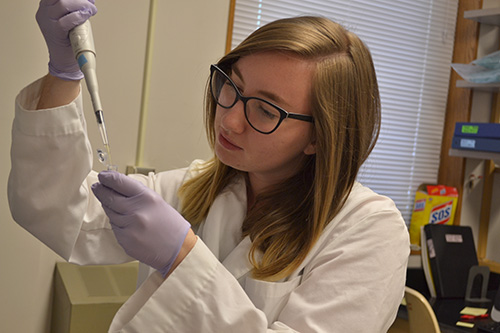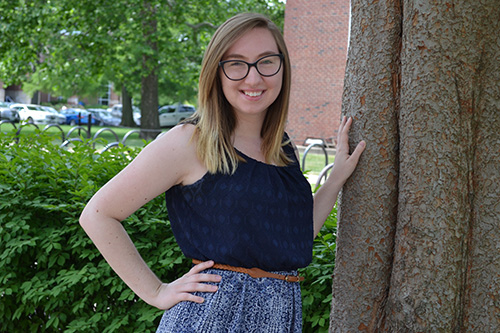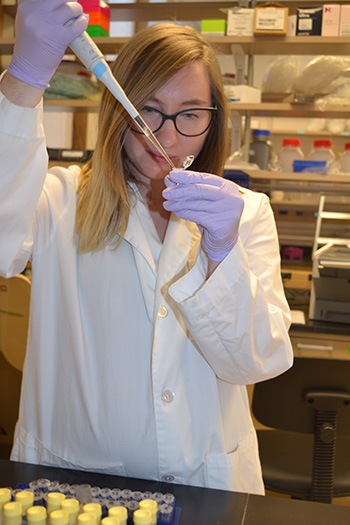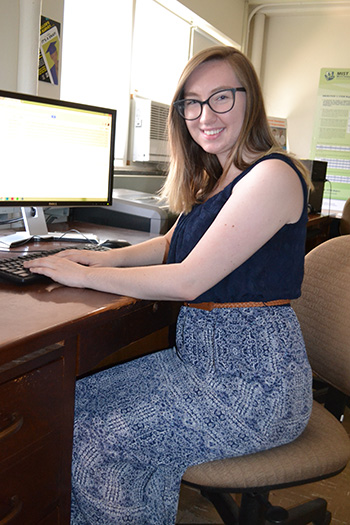By Women, for Women: Kristina Allen Discusses Her Research in Women’s Health

Kristina Allen pipetting samples in the Clancy Lab.
June 7, 2018
When most people think of anthropology majors, they may not picture them in a research lab. But rising senior Kristina Allen doesn’t let stereotypes cramp her style. She studies biological anthropology, which explores concepts ranging from human evolution to human biosocial variation from a scientific perspective. Her research focuses on reproductive ecology, and she jokes that she may be the first woman to ever say, “I love menstruation.” Allen held a love for science throughout her school years, and originally wanted to be a doctor, but switched out of premed after taking a few anthropology courses and realizing that her passion lay elsewhere. She seems to have found her niche, saying “I love what I do now.”
Allen stumbled upon her current research laboratory when she was seated at the same table as Dr. Kathryn Clancy, an Associate Professor in the Anthropology department at the University of Illinois, at a meet and greet organized by the department. Allen had just transferred into anthropology at the start of her sophomore year and knew she wanted to get involved in research. She had been looking at the ongoing research in the department, and when she shared her interests with Dr. Clancy, the latter invited her to come work in her lab and from there began a rewarding working relationship.

Kristina Allen, a senior studying anthropology.
Dr. Clancy’s lab studies how environmental factors such as lifestyle, diet, different exposures affect the menstrual cycles of healthy women. The data are collected from two different populations of women, women from rural Poland and Polish-American women from the Champaign or Chicago area. The study begins with an extensive survey about factors the women were exposed to while growing up, such as having childhood pets or working on a farm while growing up, as well as health factors such as their family history of cancer. A lot of the questions are focused on energetic activities, because women from rural Poland engage in a lot more manual labor than American-Polish women. They then move onto collecting urine samples across the whole menstrual cycle from the first day of menstruation to the first day of the woman’s next cycle. These are used to measure all kinds of hormones and the precise timing of ovulation. The researchers also collect saliva samples to genotype the individuals. This is mainly the area of expertise of one of the graduate students (who just defended her dissertation, congratulations Dr. Rodgers!) in the lab who studies epigenetics, which refers to differences in people resulting from variance in gene expression rather than changes in the DNA sequence itself.
The lab collects data for the Polish population by physically going to Poland. Graduate students are usually sent on these trips, while the American-Polish subjects are usually recruited from the campus population. They do have specific criteria for the participants in their study, such as the subjects not being on any type of contraceptive, being either first or second generation Polish-American, being non-smokers, and obviously not being pregnant or breastfeeding, as the lab is studying menstruation. Thus far, the lab has found that women from Poland tend to start their menstrual cycles at a later age than Polish-American women. They hypothesize that this variance is caused by the difference in activity levels between the two study populations.

Kristina Allen pipetting samples in the Clancy Lab.
Although being involved in research is often a necessity for those who plan to go to graduate school, Allen’s reasons for doing so are more noble. Besides making her feel like a part of something bigger, she says “By being able to do research, I am contributing to the scientific community in the only way that I really can, because as an undergraduate student, I can't go out and do some crazy research and write this huge paper.” She is wary of going to graduate school and becoming a professor because she feels that they are often caught up simply writing grant proposals and helping other people do their own research rather than being in the lab themselves. Her own faculty supervisor Dr. Clancy conducts independent research on women’s issues like sexual assault and harassment in the sciences, but does not work in the lab with Allen and the rest of the graduate students anymore. Allen vehemently opposed to the idea of being a “proposal pusher.” This has led her to consider industry positions, so she is not pigeonholed based on her research pursuits.
Her time conducting research has shown Allen new ways of thinking about knowledge. She remembers going to her research team once and telling them about feeling overwhelmed by all she did not know. Dr. Clancy turned it into a learning experience, saying, “That’s the first step in knowing more. You know what you don’t know, so you can go do research and figure out more.” That exchange broadened Allen’s perspective, and she now believes that even findings that may seem like small contributions to the body of knowledge on women’s health at first can make a large impact on the lives of many women in the future. She also credits her lab experience with teaching her how to conduct herself in a professional environment, while introducing her to the scientific community at large. Allen mentions following one of the graduate students in her lab on Twitter, indicating that the posts are mainly science-based or related to social issues, which showed her how science and women intersect today social sphere.

Kristina Allen working on the computer.
During her last year, Allen will continue taking coursework, and plans to write her honors thesis which will make her eligible for departmental distinction. She will be studying various scientific methods in determining time of ovulation. The most accurate way to do so involves undergoing an ultrasound to measure the follicles of the ovaries. However, this means doing the ultrasound exam every day, which can get time-consuming and cumbersome. Allen is comparing other methods such as measuring luteinizing hormone which is usually used in home ovulation test kits, or looking at the ratio of estrogen to progesterone present. This comparison is made by taking urine samples and using these methods to predict when the women ovulated, and then seeing how variable they are. The implications of this paper could be far reaching because there is currently no set standard in research. If researchers are getting different ovulation times based on the method they use, it could be significantly impacting the results they find in their respective studies. Allen is excited about writing the paper, because the graduate students in the lab and the PI, Dr. Clancy, will be reading it over and editing it with the aim of publishing, which will allow her to be first-author on a published paper by the end of her senior year.
Allen plans to take a gap year before going to graduate school. During that time, she wants to continue working in a lab setting to further hone her skills, either as a lab technician or a phlebotomist in a hospital. She knows that she will continue working in the field of women’s health given her interest in reproductive ecology. Allen leaves us on a high note, encouraging undergraduates to take advantage of the many research opportunities available to them at the university saying, “I think everyone should try to do it. It seems very daunting at first, but it will really help you in the long run and it's a great experience to have, especially to make connections.”
Story by Niharika Roychoudhury, I-STEM undergraduate student. Photos by Elizabeth Innes, Communications Specialist, I-STEM Education Initiative.
For more related stories, see: Undergraduate, Student Spotlight, 2018













.jpg)
















